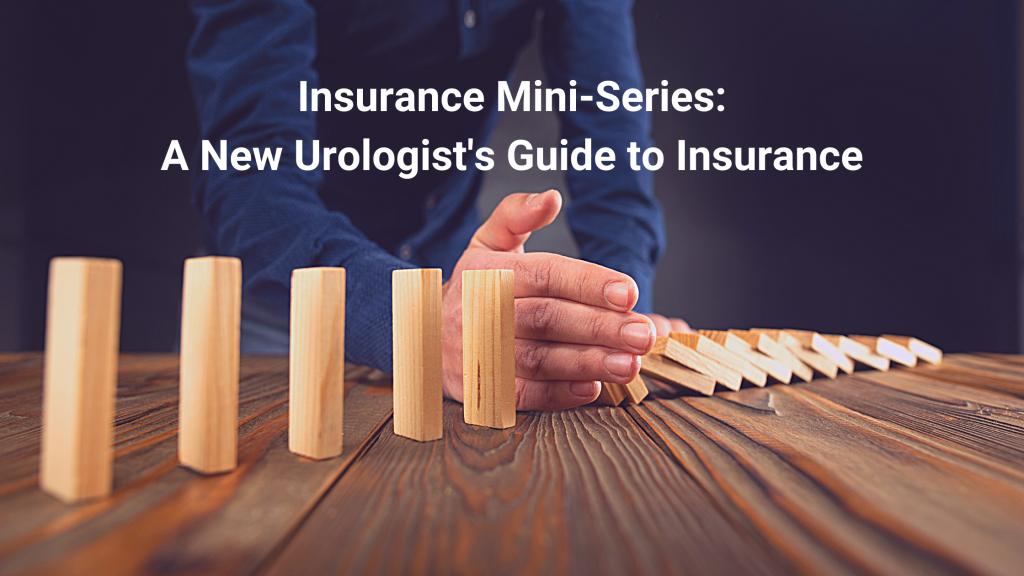You’ve made it through med school and are knee-deep in residency — what comes next?
Asset protection.
You may be laughing to yourself thinking that asset protection is for the wealthy and all you have to show for your medical education right now is a pile of student debt, but remember a young urology resident or fellow’s greatest asset is likely his or her future income!
It’s vital to be as prepared as possible for the unexpected. Let’s take a deeper dive into what type of insurance you should have and why you need it.
Why Young Urologists and Trainees Need Insurance
Buying insurance is one of those things that can so easily slip between the cracks. You’re busy, and perhaps the last thing you want to do on your one free Saturday night is research and find the best insurance policies for you — we get it.
Even though it can be a cumbersome chore, new urologists need a robust asset protection strategy. It’s critical to protecting yourself (and your wealth).
When you think about how much time and money you put into medical training and education, losing that future income stream due to death, disability, or a lawsuit could completely wipe out any return on that investment. That’s where insurance comes into play.
Disability Insurance
There are two types of disability insurance that you need to make sure you have covered: short-term and long-term.
Short-term disability
Short-term disability is offered through an employer and takes effect in your first 90 days of employment. Don’t let this benefit slip away! It’s especially important for female doctors who wish to have children to opt-in when they first start with a group or hospital because this is often how maternity leave is paid.
Long-term disability
Long-term disability, however, kicks in after 90 days of employment. Most academic institutions and hospitals offer group long-term disability as a benefit to their employees. Group benefits are usually taxable as well, meaning you’d pay tax on the benefit.
Should you purchase a group or individual policy (or both)?
Typically, group long-term disability plans pay around 60% of your income for the first 2 years up to $10,000 per month. There are a couple of issues with this process.
- First, most urologists’ income is more than $10,000 per month, leaving you underinsured.
- Second, after the first two years, if you can do any job (not just your job in medicine), your employer can significantly reduce or cut your benefit altogether.
We highly recommend purchasing your own insurance to supplement the group coverage to ensure that you are covered.
Understanding the definition of disability is key! Let’s take a look at what you WANT your policy to say:
Total disability is the inability to perform the material and substantial duties of your occupation or medical specialty.
This means that even if you retrain in another specialty, you’re still eligible for benefits because you’re unable to perform the duties of a urologist. If you have a policy in place and are unsure whether this is your definition of total disability, take a second look.
There are several riders to consider as well and a good advisor can help walk you through pricing and structure with different carriers to determine what is best for you. There is not a one-size-fits-all for physician disability and it’s important to work with an independent agent who can help you implement the best coverage.
Life Insurance
If someone depends on your income, you should strongly consider term life insurance to protect them if you pass away.
Life insurance is about the economic value of your life — use a simple math equation to figure it out. Take your after-tax earnings and multiply that by your expected working years and you get the economic value to your family over your working years.
It’s often a much bigger number than many physicians think! The cost of term life insurance is a significant factor in deciding how much coverage to carry, so once you know your economic value, your financial advisor can look at how much of that you can realistically insure based on your cash flow.
The amount of insurance needed varies from household to household. If you have a stay-at-home spouse, you may want to consider insuring that life as well because there is economic value there. If you and your spouse are both doctors and plan to continue working if something happened to each other, you may not need as much coverage.
While there are needs for permanent life insurance in a financial plan (whole, universal, variable), we typically recommend starting with term life for new to practice urologists and then down the line you might consider other options that can accomplish a specific goal or goals.
Umbrella Policy
Umbrella insurance, also known as personal liability insurance, is a back-up insurance plan that kicks in after your other insurance coverage has been maxed out. An umbrella policy covers accidents that occur because of you or accidents that happen on your property.
Umbrella is the most affordable (roughly $250-350 per month per $1 million of benefit) and often most overlooked of all the types of coverage a young physician should have. Even though liability in the hospital is covered by malpractice insurance, liability occurs outside the hospital as well.
Why Umbrella Coverage Matters: A Case Study
Here’s a real-life example. Years ago a resident client of Vestia, we’ll call him Ben, was driving through city traffic to get home after a long shift. He was wearing his scrubs and hospital ID badge and got into an at-fault accident. There was minor damage to the other car and he didn’t initially think the other driver was injured, yet soon after he was served with an $800k lawsuit! As a resident with a negative net worth no less.
The asset Ben had that could pay a judgment like that was his future wages. Luckily, Ben and his wife (also a physician) had started working with us a couple of months prior to the incident and had purchased a $1 million umbrella policy. He called his insurance company and they took care of the defense and ended up settling for a much lower amount with very little hassle to Ben.
Long story short, an umbrella policy saved the day! It’s affordable coverage that can really help you when accidents happen.
Ensure that your future is covered
Insurance may not be the most glamorous subject, but it’s important not to skip over it. Life happens — you get into a car accident, someone gets hurt on your property, or you can’t work due to an injury. You can’t control what happens in life sometimes, but you can be prepared. Take the next step to safeguarding your family, ideally with a trusted advisor who can help guide you.
Urologists deserve a financial advisor who is specialist, not a generalist. Your advisor should understand that buying into a surgery center or a lithotripter machine could be more profitable than your stock portfolio! We need to be thinking about contract negotiation, tax planning strategies, asset protection, and so much more – investments is only scratching the surface.
You have many competing priorities for your time and planning for your financial health may not make the top of your list. With a short time window to save for retirement, the opportunity cost of financial mistakes can be high.
Vestia Personal Wealth Advisors has over 100 years of collective experience working with physicians. If you’re looking for a specialist to take care of your financial life, you may want to contact Vestia and see how they can help.
Investment advisory services offered through Vestia Personal Wealth Advisors, Vestia Retirement Plan Consultants, and Vestia Advisors, LLC. Securities offered through Ausdal Financial Partners, Inc., 5187 Utica Ridge Rd, Davenport, IA. 52807 (563)326-2064. Member FINRA/SIPC. Vestia Personal Wealth Advisors, Vestia Retirement Plan Consultants, Vestia Advisors, LLC, and Ausdal Financial Partners, Inc. are independently owned and operated.
This material is intended for informational purposes only. It should not be construed as legal or tax advice and is not intended to replace the advice of a qualified attorney or tax advisor. This information is not an offer or a solicitation to buy or sell securities. The information contained may have been compiled from third-party sources and is believed to be reliable.



